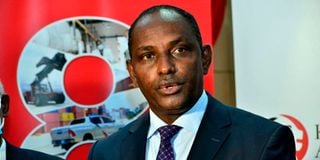
Former President Uhuru Kenyatta (left) and President William Ruto.
Billions of shillings collected from foreigners travelling to Kenya by President William Ruto’s administration was banked in Swiss accounts in a questionable deal reminiscent of the previous government’s diversion of Eurobond proceeds to offshore accounts to bypass the Consolidated Fund.
Sh6.5 billion in e-visa revenues was channelled to the Swiss account instead of the Consolidated Fund, which is the national government's main bank account run by the National Treasury, and from where there are stricter controls for withdrawals, including mandatory approval by the Controller of Budget.
Former Attorney-General Justin Muturi also recently claimed Dr Ruto had pressured him to sanction the diversion of $1 billion (Sh130 billion) environment grant from “Russian oligarchs” directly to the ministry’s accounts, but he refused and instead insisted that the cash be channelled through the Treasury.
Questions have been raised about the motive of wanting to bypass the Consolidated Fund for suspect arrangements like in 2014 when President Uhuru Kenyatta’s government funnelled $2.75 billion (Sh356 billion at the current exchange rate) Eurobond loan to offshore accounts, with the then Auditor General, Edward Ouko, expressing concerns that spending of the cash could not be traced to development projects.
Swiss firm
In the deal for electronic travel authorisation service (eTA) revenues, the government contracted a Swiss firm, Travizory Border Security SA, to collect billions of shillings from persons travelling to Kenya by offering security screening services. The company was paid Sh1.5 billion of the Sh6.5 billion revenues it collected between August 2024 and February 2025, and the money was received at a Swiss account as opposed to the Consolidated Fund, disclosures to Parliament showed.
The deal, which cost taxpayers 23 per cent of the revenues, has since flopped and the government now says the funds are being channelled through e-Citizen to the Consolidated Fund.
Mr Muturi, in a recent interview, also claimed Dr Ruto attempted to coerce him into signing documents allowing a Sh130 billion grant from Russian oligarchs for the tree-planting programme to bypass the Consolidated Fund, but he declined.

Former CS Justin Muturi.
“It was a deal where they were purporting to give a $1 billion grant to allegedly grow three billion trees, towards the 15 billion [programme]. I told them that the $1 billion could only be by way of a grant but could not come directly to the Ministry of Environment because under Section 47 of the PFM (Public Finance Management) Act, it could only go through the National Treasury. They were trying to avoid the National Treasury, yet it was money from abroad,” Mr Muturi said.
The former AG said the President attempted to coerce him into signing documents allowing the funds to flow into the country outside the Consolidated Fund—the documents brought to him to sign at the Dubai International Airport. The two botched deals have revived concerns about the place of the Consolidated Fund in managing public money, with fears of misuse and theft of money meant to benefit citizens through development projects.
The Constitution requires all money coming into the government be deposited into the Consolidated Fund, except where Parliament has created a fund to receive money for a specific cause or where state agencies use cash generated from their operations for defrayment.
“Money shall not be withdrawn from the Consolidated Fund unless the Controller of Budget has approved the withdrawal,” it states.
Previous instances where the government has channelled public funds outside the Consolidated Fund left dire outcomes as citizens were denied development projects the billions of shillings were expected to finance, even as they were left with a heavy public debt burden.
The $2.75 billion (Sh356 billion at the current exchange rate) Eurobond borrowed by the government in 2014 is one of the biggest case studies in recent memory where the government bypassed the Consolidated Fund to receive the loans in offshore accounts. The loans were received in JP Morgan Chase Bank New York and Citibank N.A New York. When auditors went to verify the flow of the money from lenders to Kenya, however, they could not find actual cash receipts from lenders at the receiving banks’ accounts. The auditors also revealed that Sh53.2 billion never reached Kenya.
“A portion of the proceeds of Eurobond totalling $604,560,737 (Sh53,201,344,900) was utilised overseas as payment of a syndicated loan. The balance of the proceeds of Eurobond from both the original issuance and the tap sale were received into the country,” the Auditor-General stated in a 2019 report.
The audit also found that the portion of Eurobond that came into the country could not be traced to any projects as they were mixed with other government cash, leaving their impact on projects invisible.
“The National Treasury explained that these funds were fungible. Furthermore, some of the funds were expended outside of the Ifmis,” the Auditor-General stated, recommending that subsequent issuance of international sovereign bonds be earmarked and be identifiable to specific development projects.
The law requires all government borrowings be used to fund development projects only, and loans coming in through the Consolidated Fund to ensure adherence. Mr Bernard Ndung’u, the Director-General of accounting services at the National Treasury, says the Consolidated Fund was created “for ease of control and oversight” of money meant to finance government operations.
“The Consolidated Fund is highly regulated. All withdrawals from the fund are initiated by the National Treasury, but approval by the Controller of Budget (CoB) is mandatory. The Exchequer Account, which hosts the Consolidated Fund, is domiciled at the Central Bank of Kenya (CBK), which ensures that withdrawals are authorised by the National Treasury and the CoB,” Mr Ndung’u says.
Consolidated Fund
Before withdrawal of any money that has hit the Consolidated Fund, the transaction must be backed by a requisition from a ministry or state agency explaining its purpose.
The Treasury then scrutinises the requisition in line with approved budgets for the fiscal year, before forwarding the request for approval by the CoB. The CBK must ensure approvals are made before cash is released. The Treasury is also required to gazette a summary of transactions on receipts into the fund and any payments from it on a monthly basis. Experts say government officials attempt to bypass the Consolidated Fund to escape stringent checks and balances that have been placed, which make it almost impossible to steal or misuse public money.
“The Consolidated Fund was established to safeguard public money and it has proper checks and controls before withdrawal of money from the account occurs,” says Mr Bernard Muchere, a former internal auditor at the National Treasury.
The controls at the Consolidated Fund makes it unattractive to steal or misuse funds once they hit the official government account, he adds.
Mr Muchere notes that there has been a lot of refusal to follow the law with regard to depositing funds meant for the Consolidated Fund, warning that evading the Consolidated Fund when dealing with public revenues risks misuse, where public funds could end up in people’s pockets. “The reason why somebody may want to avoid bringing the money through the Consolidated Fund is to avoid existing controls that are established to ensure accountability and traceability of how the money has been used,” he says.
Another audit on the use of 39 commercial loans between July 2010 and December 2021 revealed cases where Sh4.3 billion loans channelled outside the Consolidated Fund could not be confirmed to have been spent on projects. “The special audit, however, noted that drawdowns for three loans denominated in Euros totalling €29,510,462 were not available. It was, therefore, not possible to confirm the extent of utilisation of the individual loans,” the 2022 report stated.

Former Treasury Cabinet Secretary Ukur Yatani.
The three loans were contracted between 2013 and 2015. Former Treasury Cabinet Secretary Ukur Yatani says channelling public funds through the Consolidated Fund enhances transparency, accountability and full responsibility, noting that the account has foolproof controls. “You cannot disburse [from the Consolidated Fund] without internal treasury checks and CoB [approval],” Mr Yatani said.
Failed state
He said public funds flowing outside the Consolidated Fund “may happen in a failed state without a constitutional order. If this happens, all tenets of financial management will have been flouted—from transparency, accountability, prudence and good governance.”
Mr Ndung’u last week said concerns over accountability and oversight of revenues state agencies get for offering different services, which are not received at the Consolidated Fund, made the government direct that all payments for government services be made through a single paybill (222222). “As we speak, there are concerns on accountability, reporting and oversight of funds received and spent outside the CF in terms of AIA, as the funds are solely under management of individual entities. This is the reason the government directed that AIA funds be channelled through a common paybill 222222 under e-Citizen,” he said.
“However, on critical review, it would be necessary to bring the above funds under the purview of the CoB to enhance oversight during withdrawals, rather than waiting for the annual audits.”
Mr John Mutua, the programmes coordinator at the Institute of Economic Affairs, also notes that when money meant to support the government in delivery of its work through budgeted activities comes in outside the consolidated fund, it becomes difficult to know whether it has been used properly.
“If Sh1 billion is expected to be deposited at the consolidated fund but is not received, it becomes very easy to steal that money. Stealing money that has already hit the consolidated fund is very difficult, but money that evades the account would most likely end up lining other people’s pockets,” Mr Mutua says.
He notes that any diversion of public funds has long-term economic impacts where citizens miss development projects. “We end up using taxes to fund projects that were supposed to be funded with grants/loans but they were misused.”










